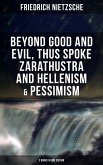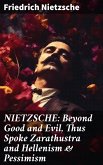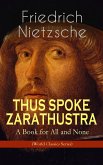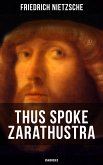In "Thus Spoke Zarathustra," Friedrich Nietzsche presents a philosophically rich and poetically profound exploration of morality, individualism, and the nature of existence. Written in a unique blend of prose and verse, the book is structured as a series of discourses delivered by the titular prophet Zarathustra, who descends from the mountains to share his insights with humanity. Nietzsche employs a lyrical style that intertwines existential themes with a critical reexamination of traditional values, challenges pervasive nihilism, and advocates for the creation of one's own values, encapsulated in his concept of the Übermensch. This seminal work is often regarded as a cornerstone of existential philosophy and modern thought, reflecting the anxieties and aspirations of the late 19th century. Friedrich Nietzsche, a pivotal figure in Western philosophy, wrote "Thus Spoke Zarathustra" during a period of personal introspection and health struggles, which informed his radical ideas on morality, religion, and individuality. Influenced by his reading of Arthur Schopenhauer and the burgeoning intellectual currents of his time, Nietzsche sought to articulate a vision that transcends conventional beliefs, prompting a reevaluation of truth and personal agency. His unique cultural context, marked by the decline of religious authority and the rise of secular humanism, played a significant role in shaping the development of his philosophical ideas. This book is essential reading for anyone intrigued by the complexities of human existence and the quest for authenticity. Nietzsche's incisive prose challenges readers to confront their assumptions about morality and societal norms, making it a transformative experience for both philosophical novices and seasoned thinkers. "Thus Spoke Zarathustra" invites you to embrace the journey of self-overcoming and to explore the radical potential of your own will, leading you toward a deeper understanding of life.
Dieser Download kann aus rechtlichen Gründen nur mit Rechnungsadresse in A, B, BG, CY, CZ, D, DK, EW, E, FIN, F, GR, H, IRL, I, LT, L, LR, M, NL, PL, P, R, S, SLO, SK ausgeliefert werden.










